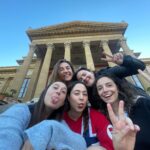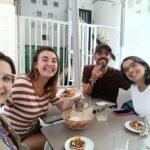Artículo escrito por Talia Delgado Trainer & freelance journalist y participante en ‘The Break’ 2022
El pasado mes de octubre tuve la oportunidad de conocer Gran Canaria de la mano de Pueblos Remotos, nuestra organización de acogida, en el marco del programa The Break Women Entrepreneurship & Internationalisation in Spain (https://the-break.eu/) un programa de atracción de emprendimiento femenino europeo a España que tiene como objetivo conocer el ecosistema empresarial español, establecer relaciones comerciales e invertir, favorecer el retorno de talento femenino español a la vez que se contribuye a la resolución de algunos retos sectoriales que ayuden al desarrollo local.
Durante la primera fase de este programa, que tuvo lugar en octubre y noviembre, fuimos elegidas 280 mujeres emprendedoras de toda Europa que recibimos formación y mentorías durante dos meses, incluyendo un retiro presencial de 25 días en diferentes zonas de España para impulsar nuestros proyectos, mejorar nuestras habilidades de negocio y crear una comunidad de mujeres emprendedoras en la UE.
En grupos de diez fuimos distribuidas en 12 localidades españolas fuera del circuito de grandes ciudades o capitales. Así fue como llegué a Gran Canaria, concretamente al municipio de Agaete. Canarias era una gran desconocida para mí, nunca había estado, ni siquiera antes de irme a vivir a Rumanía, donde resido desde hace veinte años. Nunca me imaginé que este sería mi destino, pero me alegro de haber tenido la oportunidad de descubrir no sólo sus paisajes, sino sobre todo su gente, historia y su cultura.
Fotografía realizada durante el Welcome Day con la cohorte de octubre de 2022
Decidí unirme a “The Break”, porque combinaba elementos innovadores comparado con otros programas de emprendimiento. Éramos todo mujeres de diferentes países, la calidad de los mentores y de los contenidos me parecieron una oportunidad única y además, íbamos a intentar resolver un reto local, que fue lo que más me atrajo porque me preguntaba cuál sería el reto, cómo íbamos a ser capaces de trabajar juntas viniendo de países y experiencias diferentes y cómo iba a reaccionar la gente del lugar teniendo en cuenta que no vivimos allí.
El reto contenía otros retos. Para guiarnos en esta tarea tuvimos a Pueblos Remotos, que tienen experiencia y nos abrieron no solo sus corazones, sino también las puertas de una aventura antropológica, sociológica, gastronómica, histórica y cultural única.
Teníamos 25 días para entender la zona, profundizar en el problema que había que resolver y trabajar en equipo junto a los habitantes de la zona para sentar las bases de la solución. Para ello, Elsa, Carlos y Gonzalo habían preparado una serie de visitas y encuentros con emprendedores locales de la región, que está dividida en tres zonas, la costa, el valle y la cumbre. En cada una de ellas se lleva a cabo una actividad empresarial. Nuestro reto era lograr que los emprendedores de esas tres zonas cooperasen entre sí para el mejor desarrollo de la economía del lugar.
Así fue como conocimos a emprendedores cafeteros con los que aprendimos sobre la larga tradición de Agaete en la producción de café, plantamos incluso arbustos, visitamos frutales, conocimos artesanos queseros e hicimos queso con ellos, alfareros tradicionales de un tipo específico de cerámica, conocimos a mujeres emprendedoras que cultivaban gofio, emprendedoras en hostelería o en turismo, a los gremios de pescadores, a las autoridades locales y a dueños de hoteles y restaurantes.
Talia Delgado plantando un cafetal en la Finca La Laja
Durante cada una de esas visitas recibimos una pieza de información que nos ayudaba a entender no sólo los problemas a los que se enfrentan sino también su hábitat, su forma de vida y sus costumbres. Conviviendo con ellos, compartiendo comidas, reuniones y charlas íbamos entendiendo y aprendiendo sobre la vida, la historia, la pasión de estas personas por mantener su región y su economía. Después de estos encuentros terminabas agotado por la cantidad de información recibida, pero al mismo tiempo te estimulaba porque habías aprendido tanto en un tiempo tan breve.
Nos dividimos en grupos en función de habilidades y experiencias para ser más efectivas y cada grupo se ocupó de un sector. Así comenzó la segunda parte del reto, las entrevistas personales donde fuimos hablando con diferentes emprendedores del sector para entenderlo más en profundidad. Hubo encuentros multilaterales con emprendedores y autoridades públicas, hubo mesas redondas y finalmente, después de un arduo trabajo, pudimos presentarles en un encuentro general con todas las partes las propuestas que el siguiente equipo de emprendedoras, que vino en noviembre, se encargó de implementar.
Lo mejor de todas estas interacciones, tanto con los locales, como con el grupo de trabajo, era sin duda el factor humano, convivir, compartir ratos, comidas, bailes, historias o lo que fuera. Esta interacción nos permitía a todos conocernos mejor, a los locales saber más sobre otras formas de hacer las cosas en otros lugares del mundo, a nosotras entender sus realidades, el lugar y sus necesidades y ver otras realidades diferentes a las que tradicionalmente se asocia Canarias, como sol y playa. Para todas fue más sencillo conocer de quienes lo viven cuáles eran sus necesidades, sus dificultades y nos facilitó el trabajo porque pudimos ponerle cara y nombre propio a los problemas.
Además, el proceso nos ayudó a trabajar mejor en equipo, a dar lo mejor de cada una, no para resolver un problema sino ayudar a una persona que conocíamos porque habíamos tomado un café con ella, o cogido mangos de su patio, o conocido a sus cabras, probado su pescado y su gofio, o habíamos paseado por los lugares de su infancia y sus historias.
La unión de todos estos elementos fue lo que dio valor a la experiencia porque no se trataba de individualidades sino de grupos que interaccionan, tal y como lo hacemos en la sociedad, aunque a veces se nos olvide que la unión hace la fuerza y que lo mejor de las sociedades y su desarrollo viene dado por la cooperación y no por el individualismo.
En Gran Canaria, en el último encuentro que tuvimos antes de regresar con otras mujeres emprendedoras, nos hablaron sobre algunas de sus preocupaciones, como la necesidad de emprender, el sentirse solas sin redes de apoyo, la falta de cultura emprendedora de la zona, el miedo de que los programas para atraer talento digital que se están llevando a cabo generen subidas de precios, gentrificación y acaben promocionando las islas de nuevo como destino de sol y playa en vez de atraer ideas, colaboraciones, inversiones y negocios sostenibles.
Gran Canaria ya es uno de los destinos preferidos para nómadas digitales y la recién aprobada Ley de Startups quiere apoyar en toda España la creación y el crecimiento de empresas emergentes, fomentar la relocalización de estas en España, atraer talento y capital internacional, así como estimular la inversión pública y privada en ellas. Pero quizá haya que considerar también incluir mecanismos de integración local para evitar el posible impacto negativo y fomentar una verdadera cooperación entre emprendedores locales, e internacionales, que ayuden realmente al desarrollo de las zonas en las que se sitúen.
Testimonio de Talia Delgado sobre su experiencia en ‘The Break’ 2023
Hace años se hablaba de glocalización, su lema era «piensa globalmente, actúa localmente» y hacía referencia a personalizar, o adaptar, patrones de negocio a condiciones locales. El término se aplicaba a la economía, pero también a la cultura y al desarrollo de manos de las ONGs. Los primeros en practicarlo fueron los empresarios japoneses en los años 80, lo denominaron dochakuka, que significa «el que vive de su propia tierra».
Quizá debería rescatarse el término y darle un giro similar al que Pueblos Remotos práctica de modo que quienes vengan a establecerse como emprendedores, pudieran interaccionar con la gente del lugar, colaborar y apoyar su crecimiento personal y profesional.
Uno no puede vivir ajeno a la cultura del país en el que se establece, sin conocer la zona donde te has establecido. Para entender por qué suceden determinadas cosas sólo puede hacerse con la inmersión personal en la vida local, hablando con la gente, siendo partícipe de sus realidades. De esas interacciones y charlas surge el conocimiento, el entendimiento, pero también las ideas y las colaboraciones. Recordemos lo que pasaba hace siglos en los cafés literarios o en los encuentros de artistas de diferentes países. La creatividad, el entendimiento y la cooperación fluían y generaban nuevas ideas y corrientes artísticas. Si lo extrapolamos al mundo empresarial esos cafés serían los hubs, pero a veces son homogéneos y agrupan gente de un mismo sector.
¿Qué pasaría si aunáramos todos estos elementos en un lugar donde los emprendedores pudieran residir, contribuir con su talento a la resolución de problemas locales y al tiempo aprender sobre otras formas de hacer y ver las cosas?
No es necesario fantasear porque ya existe, Pueblos Remotos ha sentado las bases de experiencias que en el futuro serán un modelo a seguir de integración y sostenibilidad.








